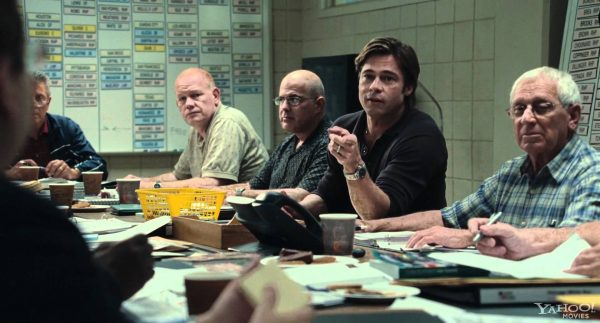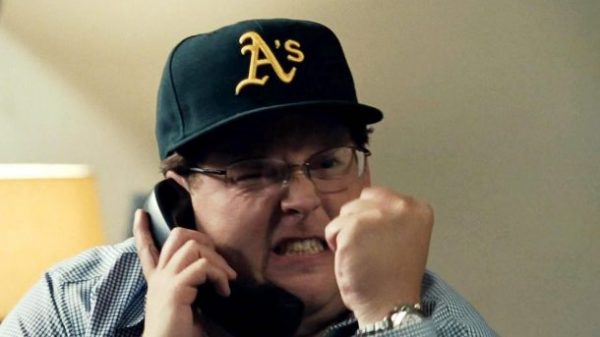Industry Spotlight; Permanent Recruitment Meets Moneyball
04 April 2018
Moneyball: “The Art of Winning an Unfair Game.”
There’s a line in the book “Moneyball: The Art of Winning an Unfair Game,” that raises a red flag for anyone working in HR/Recruitment or – for that matter – anyone who’s ever had to hire an employee. Author Michael Lewis asks: “…if gross miscalculations of a person’s value could occur on a baseball field, before a live audience of thirty thousand, and a television audience of millions more, what does that say about the measurement of performance in other lines of work? If professional baseball players could be over- or under- valued, who couldn’t?”

Lewis’ book and the movie that followed recount the true story of Billy Beane (Brad Pitt), general manager of the Oakland Athletics, and his untraditional approach to hiring ball players. Beane’s challenge was to build a winning baseball franchise with a payroll that was dwarfed by his competition. Sound familiar?
Instead of turning to the usual metrics such as a pitcher’s Earned Run Average (ERA) or the “gut feel” of his staff, Beane focused on the strong correlation between “on-base” percentages and winning games- throwing convention and subjectivity out the window.
Beane’s experience got us thinking about today’s hiring processes and what lessons we can learn from the Oakland A’s.

Here’s what I came up with (along with a few lines from the movie and the world wide web):
Job Descriptions
“I pay you to get on first, not get thrown out at second.” – Billy Beane
Beane’s limited payroll forced him to define what the team needed to win. So how can businesses nail down what they are looking for?
Today there are millions of job descriptions that are ambiguous, and there are just as many employees that don’t really understand what it is they are going to be held accountable for. A good Permanent Recruiter who understands your business, can help here. In collaboration with you they can help to isolate one year’s worth of measurable accountability… or in other words, “tell someone what number you have to put on that scoreboard to succeed.
A good job description typically includes several specific items that an employee needs to be held accountable for.
Management needs to nail down what they really want this person to do, and be prepared to hold the person accountable. Too many times companies set up a failure scenario because there are too many different agendas and after everyone chimes in you end up with a job description that no one can reasonably do.

Avoiding Duds
“Billy, of the 20,000 notable players for us to consider, I believe that there is a championship team of twenty-five people that we can afford, because everyone else in baseball undervalues them.” – Peter Brand
In the movie, subjectivity was removed from the process of recruiting and acquiring talent by integrating a predictive science that established the unique behavioral characteristics to the best performers. They did not target the players with established track records who required more money than they could afford. They hired the players who possessed the DNA for the position based on what science told them and the specific observations in camp.
At Horner Recruitment we recommend following three steps when evaluating a candidate:
1. Fit
Will a candidate thrive in the company culture based upon preferences such as type of work environment, compensation and leadership style?
2. Talent
Does a candidate have behavioural talent to be successful in the role? To answer the questions make use of available assessment tools. While an assessment tool never should indicate the final yes or no for a candidate, it will measure a candidate’s aptitude in areas related to the best in the job. Behavioural-based questions used during the interview will help identify potential gaps in the assessment.
3. Skills
Similar to the movie Moneyball, an employer needs to observe as many of the skills as possible to determine how long it will take for this person to become a first-string player.
Hiring managers often start with skills – impressed by the prior experience or learned abilities that the candidate highlighted on the resume. Hiring candidates based on listed skills rather than taking into account other aspects, such as fit and talent often leads to turnover in the first year.

The cost of a wrong hire is significant. Depending on the position, a wrong hire may cost a company between six to 15 times the base salary. If that seems high, consider both the costs of recruiting the candidate, and the long-term “lost opportunity costs” of a wrong hire. Lost opportunity costs may include missed sales targets or deadlines, lost customers, or having to rebuild a business unit after a toxic manager leaves.
Strategies for avoiding a wrong hire include:
- Conduct in-depth interviews, with detailed questions that delve into each position the candidate has held
- Discuss successes, failures, key relationships and appraisals by every boss
- Make sure candidates understand that they will need to arrange reference calls with their former bosses
Conclusion
Recruiting can be a flawed process – resumes are distorted and candidates are trained on how to interview. So employers need to be prepared. As Beane discovered, gut reactions and managerial instincts need to be replaced with a systematic hiring process that improves the odds of hiring the best fit candidates.
Remember to ask yourself: Are there areas within your business that if you improved talent would make a significant difference to profits and growth? Are you still recruiting in the same way, using the same old conventions that have been around for the last 20 years?

If the answer is yes, an experienced Permanent Recruiter could make the positive difference to your talent acquisition, ultimately corresponding to your profits and growth.
Melbourne businesses that need new permanent staff should get in touch to discover the difference that a highly skilled new team member can make. For more details, contact HORNER.

